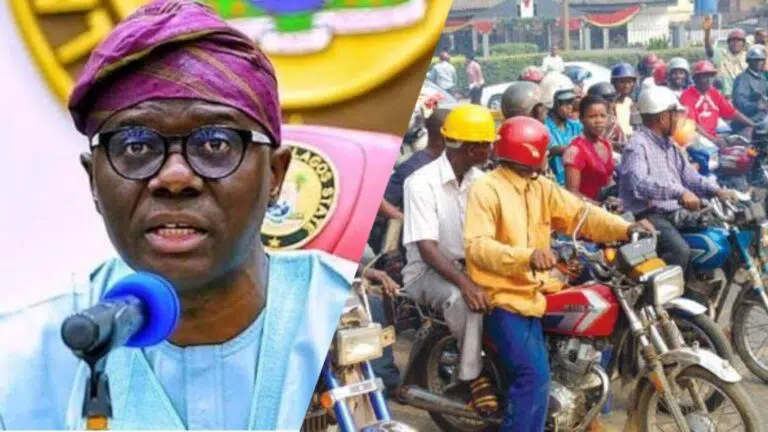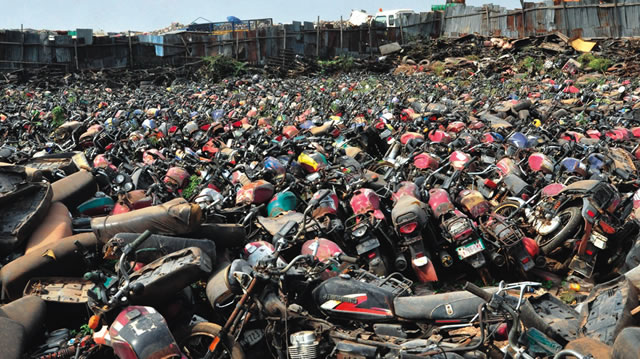Opinions
The Days Of Okada, By Luke Onyekakeyah
Anyone who reduces the okada anomie to provision of employment does not wish Nigeria well. If employment for the youths has been reduced to okada transport, then we are finished as a country.
We are in this mess because the Lagos State Government failed to enforce a ban it announced eight years ago in 2013. Provision should have been made by now for alternative means of transport. Governor Babajide Sanwo-Olu is only enforcing an existing law as the following comments first published April 18, 2013 show.
With the near total ban of commercial motorcycle operators otherwise called okada from all major highways and highbrow residential areas in Lagos metropolis, one can sense that the days of okada in the city are numbered. This is against the backdrop of the menace of this form of urban transport in the city.
While it can’t be denied that many able-bodied youths have of recent found commercial motorcycle business as a readily available form of survival, the truth is that the negative implications of okada on the operators, the society and the future of the country, are enormous.
It must be acknowledged that the Lagos State Government has exercised long restraint in taking action against okada, which in effect has given rise to its unfettered and unregulated multiplicity in the metropolis. There is no doubt that the decision to regulate okada and enforce all traffic rules this time around is overdue and carries the full weight of law.
Since traffic enforcement agencies are empowered to arrest and impound any okada that flouts the government order, it is therefore in the interest of the riders to comply. More importantly, it is advisable for the riders to begin to think of a better alternative.
The reasons are obvious.
Across the country, governments are becoming uncomfortable with okada operation. That is why it has already been banned in FCT, Abuja; Delta, Enugu, Imo and Rivers States.
Undoubtedly, more states are inching towards banning okada, especially as the crime rate perpetrated using okada increases and insecurity worsens. Okada has turned out to be the most reckless form of city transport that endangers motorists and other road users. Besides, it is believed that most of the riders in Lagos and elsewhere are from the neighbouring countries including Niger Republic and Cameroon, thereby putting Nigeria at risk. Most okadas are not registered; hence, it is difficult to ascertain who is who?
The clamp down by the Lagos State Government was announced by the State Governor, Mr. Babatunde Fashola, SAN, in Ikeja at a stakeholders’ forum. According to him, the aim of the ban is to protect lives and property, given the alarming rate of okada-related accidents.
The Governor noted that the applicable traffic laws and regulations are not new, except that they were not enforced. Consequently, okada have taken advantage of the failure of enforcement to become a menace in the city.
But in a swooping ban that effectively restricts okada only to the adjoining suburbs; the Governor listed the roads and areas that are now prohibited to okada. The areas cover the entire Lagos Island, Ikoyi, Victoria Island, Lagos Mainland, Ikeja and adjoining highbrow areas.
The specific areas include the Lagos CBD, Bonny Camp area, Ozumba Mbadiwe, all the major roads in Ikoyi including Awolowo road, Bourdillon, Alexander, Osborne, Alfred Rewane roads and Gerard Avenue.
On the mainland area are Funsho Williams Avenue, Eko Bridge, Apongbon, Muritala Muhammed Way, Jibowu to Yaba, Oyingbo, Iddo, Idumota and Ikorodu road. The others are Badagry Expressway, Apapa-Oshodi Expressway, Awolowo road in Ikeja, Secretariat and Alausa areas, Lagos-Abeokuta road, Agege Motor road and Third Mainland Bridge.
Since the ban was announced on August 25, various law enforcement agencies have swung into action. On September 6, 2010, the first day of the commencement of the ban, thousands of riders were arrested and truckloads of impounded motorcycles were taken away. It is not known to what extent this operation could go and how effective it would remain considering that similar restrictions in the past didn’t yield the desired result.
Can the Lagos State Government be able to enforce the restriction as it has been done in other states? Wouldn’t this create another opportunity to enrich all manners of traffic personnel who are now harassing okada in every nook and corner of the city?
Looking at the genesis of okada in Nigeria, it is clear that the phenomenon is a direct consequence of the collapse of the industrial and agricultural sectors of the economy in addition to lack of good urban mass transit system. Commercial motorcycle operation has its origin in the mid-90s. As a result of the economic crunch of the 80s, some jobless youths began to use motorcycles for commercial purposes. Because of the lack of adequate taxis and mass transit in the cities, stranded passengers who needed to move from one part of the city to the other began to patronise okada.
As the fortunes of the economy dwindled and more people were thrown out of jobs while fresh school leavers began to experience difficulty in getting jobs, the okada economy began to gain prominence. Since 1985 or thereabout, the economy has remained on a steady decline with acute unemployment. I want to state however, that it is the absence of good means of urban mass transit that has promoted okada operation in Nigeria and not necessarily unemployment.
If there were good intra-city transit systems like you have in many developed countries, unemployment alone couldn’t have brought okada into the system. This is true because no one can operate commercial motorcycle in New York, London, Tokyo, and others and expect patronage. People have better and cheaper modes of mass transport in those cities.
Consequently, the provision of better alternative modes of transport in Lagos and other cities is an effective solution to the okada menace in the city.
The benefits of okada, which include ready employment and as a means of livelihood have been well expressed by the riders themselves. Whatever the merits might be are obviously unsustainable. No youth can build his future on okada. And there is no way Nigeria can have a bright future with a horde of okada riders in control. Records show that about 88 per cent of okada riders aged between 15 and 30 that constitute the cream of the country’s youth are in dire poverty and largely without education. The allusion by Governor Fashola as to the non enforcement of extant traffic rules and regulations is an indictment on the government.
It is strange that despite the presence of all manners of traffic personnel on Lagos roads in particular, basic traffic rules and regulations are not enforced. For example, there are on the roads, Traffic Police, LASTMA, VIO, ‘Yellow Fever’, FRSC, Road Marshals, task force, local council officials, among others, all parading to be enforcing and/or controlling traffic with no effect.
It should be stated that the failure of governments to do their job in the first place created room for the emergence of okada in Lagos in particular and the country as a whole. The okada phenomenon didn’t emerge by magic. It started with one person and gradually others joined. From the outset, the traffic personnel on the roads turned a blind eye to okada, only concerned with extorting money from them. The failure of law enforcement officers encouraged the multiplication of okada until it became a nuisance.
No responsible government would permit blatant lawlessness to ruin the society. While okada may be permitted in the rural communities owing to poor transport in those areas, it should be completely banned in the cities. Adequate intra-city transport system should be provided by the authorities and private investors.
The debilitating effects of this form of transport are much on the society. Okada riders constitute a large proportion of the urban poor in Nigeria. Urban poverty anywhere in the world is a stigma on the society. The more such people abound, the more there is crime and insecurity. What any forward-looking country does is to reduce to the barest minimum the number of the urban poor. From that angle, it is not enough to ban okada.
There should be a pragmatic programme to disengage the okada riders and absorb them into more useful, sustainable and safer economic activities. Government should look inwards to agriculture, which has the capacity to absorb millions of youths.



